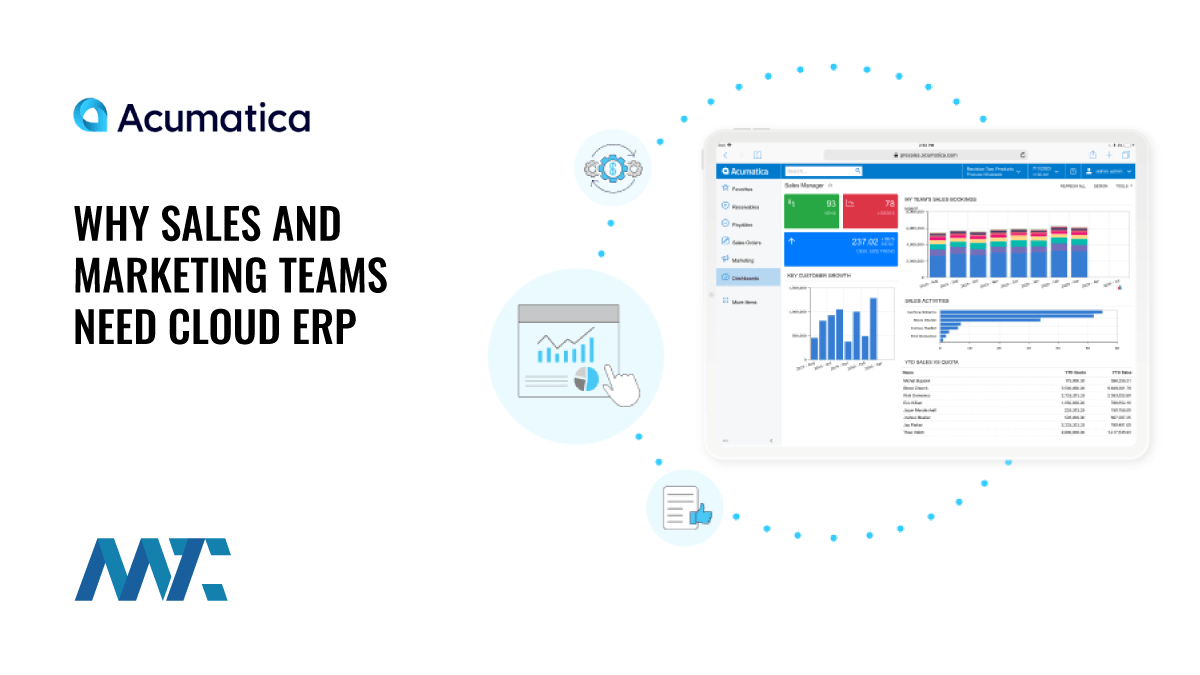Marketing and sales leaders are integral components in driving company revenue. The marketing department is vital in promoting the business, detailing its offerings, and establishing its differentiators. Marketing also generates interest in the product and creates leads or prospects. In concert, sales teams focus on converting prospects to paying customers. The functions are closely intertwined and critical to a business’s overall success.
Given the impact sales and marketing have on the bottom line, it’s vital that decision-makers maximize the time and talent they have available. To do so, they must have insight into how the teams are performing across the entire product line. Advancements in technology have made it easier to gain real-time access to information about a business’s staff and customers.
What is ERP?
ERP software manages and integrates key business processes in real-time. It helps streamline activities such as accounting, procurement, project management, supply chain operations, and manufacturing. By bringing all these functions into one system, ERP improves visibility, efficiency, and decision-making across the organization.
Companies typically need an ERP system when they outgrow basic accounting software, manual processes, or disparate systems that no longer support their growing complexity. This often occurs when a business experiences expansion, increased volume, or needs for more sophisticated operations. ERP solutions are essential when businesses need better control over their processes, data consistency, and scalability to support growth.
What is Cloud ERP?
Cloud ERP refers to ERP software that is hosted and delivered through the internet rather than on-premises. Unlike traditional ERP systems, which require physical hardware and infrastructure, Cloud ERP is maintained and updated by a third-party provider as SaaS. This model allows for more flexibility, scalability, and reduced IT costs since companies can access the system from anywhere, using any internet-connected device.
With Cloud ERP, businesses no longer need to invest in expensive hardware or IT resources to maintain their systems. This allows companies to focus on core activities while accessing the most up-to-date software and features. The most significant benefits of Cloud ERP include:
- Real-Time Data Access: With Cloud ERP, teams can access crucial business information from anywhere, at any time, providing instant insights into operations, finance, inventory, and more.
- Scalability: As your business grows, your Cloud ERP system can easily scale up to meet increased demand without costly infrastructure investments.
- Lower Total Cost of Ownership (TCO): Cloud ERP reduces the costs associated with physical hardware, manual updates, and system maintenance by shifting these responsibilities to the service provider.
- Security: With top-tier security measures, data is protected with encryption, ensuring it remains safe from unauthorized access or breaches.
- Faster Implementation: Cloud-based ERP systems are quicker to implement compared to traditional on-premise ERP, allowing businesses to become operational more swiftly.
- Automatic Updates: Cloud ERP vendors manage and deploy updates automatically, ensuring the system stays current with the latest innovations and security measures without downtime.
When businesses adopt Cloud ERP, they can eliminate the inefficiencies of disconnected systems, improve collaboration, and foster growth. Whether your business is looking to centralize data, optimize processes, or improve decision-making, Cloud ERP provides a comprehensive solution for modern enterprises.
How Is Cloud ERP Evolving?
Interest in and adoption of cloud and mobile business management solutions has been growing in recent years. Increasing advancements in technology have raised the requirement for connected devices and real-time data to help inform crucial business decisions. The utilization of smart devices such as phones, tablets, and other digital assets has changed the workplace.
Since the COVID-19 pandemic, demand for cloud and mobile solutions has exploded. The need to conduct business from anywhere and at any time has increased the demand for cloud connectivity. This demand has led to the rapid adoption of mobile business management systems that equip employees with the ability to work from outside the office and stay updated on corporate data in real-time. Gartner forecasts that worldwide public cloud revenue will grow by 6.3 percent in 2020. Further, software as a service (SaaS) remains the largest market segment and is forecast to grow to $104.7 billion in 2020.
Automatica
Acumatica recognized the need for cloud and mobile solutions since its founding in 2008, and constantly improves its solutions to better serve the evolving needs of midmarket growth businesses. Just this past September, for instance, Acumatica announced the release of Acumatica 2020 R2, the second of its biannual product updates.
The new product release comprises of a significant number of updates, including:
- Integration with leading eCommerce application Shopify
- Automated AI/ML-enabled Accounts Payable document creation, which simplifies how users prepare data that can be visualized on dashboards, analyzed in pivot tables, and used for real-time notifications.
- A fully native POS software solution that provides retailers with real-time inventory availability, multiple locations, and back-end warehouse management with barcode scanning. Now, users can manage a complete omni-channel experience without having onsite staff.
- AI/ML-enabled advanced expense management, which incorporates electronic banking feeds for corporate cards and automates receipt creation to streamline processes for ordinary mobile users as well as back-office accounting personnel.
Expense management is especially relevant right now in corporate finance departments. The pandemic has led companies to put new emphasis on expense management, with a focus on finding areas for cost savings. The unprecedented events of this year have reinforced the need for businesses to invest in better visibility, better cost controls, and automation. Business leaders need resources, now more than ever, to make more informed business decisions. Acumatica’s new machine learning capabilities will get smarter over time, learning from manual corrections of imported data to ultimately streamline common financial processes and save businesses money.
How Can Cloud ERP Support Sales And Marketing?
Cloud ERP can provide sales teams with a complete view of opportunities, contacts, and all activities that influence the sales decision. In addition, lead assignment and workflows can help manage sales processes to improve efficiency. ERP tools enhance information flow, reduce sales cycles, and increase close rates.
For marketing teams, cloud ERP can support an integrated marketing solution, tightly connected with financials and content management. Having an integrated marketing solution can improve collaboration between sales, marketing, and support while also ensuring maximum ROI for each marketing dollar spent. Coupled with an ERP system, marketing teams can also leverage Customer Relationship Management (CRM) systems to manage leads, improve conversions, measure campaign performance, communicate with contacts, and improve productivity. They can also capture leads from web forms, purchased lists, advertisements, direct mail, events, and other sources.
Due to their web-based architecture, most cloud ERP offerings come with APIs for rapid integration to other mission-critical software tools and programs. The benefits for sales and marketing teams are many, including faster and cheaper implementation and more rapid time-to-market for mobile strategies. By implementing a cloud ERP solution, sales and marketing teams can gain greater control over their processes and better insight into their operations in real-time. They can keep productivity high by offering staff online access to up-to-date information from anywhere using any device at any time.



